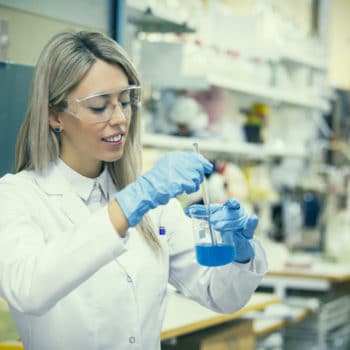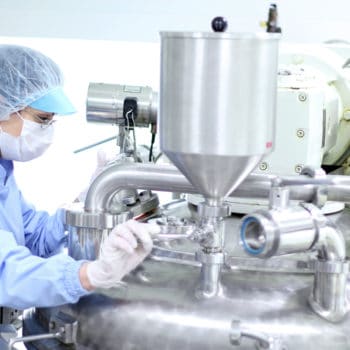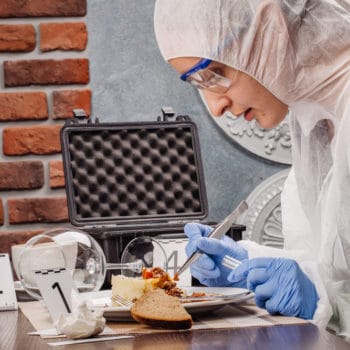Why We Love It
-
$77,860Potential Avg. Salary*
-
Growing DemandJob Outlook
* Salary & growth data is based on the recent Bureau of Labor and Statistics data published at https://www.bls.gov/oes/current/oes192031.htm for 19-2031 Chemists 11/2021. Based on national data, not school-specific information. Conditions in your area may vary.
In a bachelor of science in chemistry program, you’ll study the composition and manipulation of chemicals and chemical processes, learning how to deconstruct and combine chemicals to create desired reactions.
This knowledge is applicable to a wide range of careers across many industries, and graduates commonly find work in engineering, healthcare, education, and research and development.
What is a Degree in Chemistry?
While many people associate chemistry with rote memorization of the periodic table of elements, the subject is much more exciting than high school chemistry classes would lead you to believe.
Chemists study all aspects of chemicals, learning about their structures and compositions, understanding how to break them down, and conducting research into new chemical combinations that lead to the development of new textiles, crop seeds, pharmaceuticals, medical treatments, and energy sources.
In a chemistry program, you’ll learn how to identify different chemicals, gain an understanding of how chemicals are used to innovate across many different industries and learn how to safely experiment with chemical combinations to yield unique results.
Most graduates of chemistry programs find work in research and development laboratories as research assistants and technologists, but others earn graduate degrees to work in chemical and biochemical engineering, pharmacology, and educator roles.
Recommended Schools
What Courses Would I Take For a Major in Chemistry?
- General Chemistry
- Inorganic Chemistry
- Principles of Chemistry
- Organic Chemistry
- Analytical Chemistry
- Physical Chemistry
- Advanced Synthesis
- Surface and Interface Analysis
What Jobs Can You Get with a Degree in Chemistry?
Individuals with a deep understanding of chemistry should have a variety of career opportunities to consider after graduation. The majority of chemistry program graduates find work as researchers, assistants, and technicians in government, university, and private research and development laboratories.
Many also earn their engineering licenses and become chemical engineers for chemical manufacturing plants. The biggest growth, though, is expected to be in the pharmaceutical and healthcare industry, so graduates may want to focus their studies on coursework related to that sector.
How Long does it take?
A bachelors in Chemistry will have a typical length of 4 years in a full time schedule. That said, there are many ways to speed up the timeframe by either taking more units via online coursework, community college, or taking free classes at OnlineDegree.com that could transfer to universities in the US.
Recommended Schools
Best Jobs for Chemistry Degrees
To work as a chemist, chemistry professor, or chemical researcher, you’ll need to earn one or more graduate degrees, but there are still plenty of career opportunities for bachelor’s degree holders.
Graduates find work in chemical research laboratories as assistants and technologists, and many pursue engineering licenses from ABET to qualify for work as manufacturing, chemical, or materials engineers.
How to save time and money
Our mission is to help you to avoid paying full price for college. We want your Chemistry degree to be affordable and accessible. Here’s how you could save:
Create Your Free SmartPlan

There are many ways to make college affordable and accessible.
That’s why we created a helpful tool called SmartPlan.
It’s free, and helps you find potential ways to save and tons of information about each school you’re considering
Think of it as your “college blueprint”, to help you instantly craft a path to your degree:
- Which Colleges Match Your Needs
- Ways You Could Save Time & Money
- Free Courses You Could Take for Credit
- Valuable Data and Insights on Each College
- Detailed Steps You Should Take!
See what’s possible for you and generate a free plan within just a few minutes
Create My SmartPlanYou Might also be Interested in
Many visitors who look for a degree in Chemistry are also interested in the following degrees.













